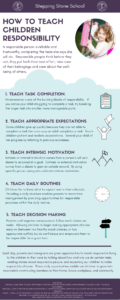Teaching Responsibility
In many of our Stepping Stone School prekindergarten classrooms, you will notice a classroom chore chart. Using this list of chores, teachers encourage children to take on certain roles and responsibilities as a member of the classroom community. Children work together to straighten the classroom, welcome guests, and line up at the door. They are learning responsibility and the satisfaction of a job well done.
A responsible person is reliable and trustworthy, completing the tasks she says she will do. Responsible people think before they act, they put forth their best effort, take care of their belongings and care about the well-being of others.
Within the classroom and at home, caregivers teach responsibility through modeling the following skills:
- Teach task completion. Perseverance is one of the building blocks of responsibility. If you notice your child struggling to complete a task, try breaking the larger task into smaller, more manageable parts. With older children, caregivers may offer questions like “What should we do first?” “What will we do next?” Questions like these invite the child to problem solve how to achieve goals which is an extremely important skill for future success.
- Teach appropriate expectations. Some children give up quickly because they are not able to complete a task the same way an adult completes a task. Teach children patient and realistic expectations. Remind your child of her progress by referring to previous successes. Additionally, manage your own expectations, your toddler may not wipe the table as quickly or thoroughly as you do, but at least he is beginning to learn the expectation. Welcome your child’s willing attitude to help to know you are laying the foundations of responsible living.
- Teach intrinsic motivation. Intrinsic or internal motivation comes from a person’s will and desire to accomplish a goal. Extrinsic or external motivation comes from a desire to gain an outside reward. By using specific praise, caregivers cultivate intrinsic motivation. Specific praise describes the action or behavior observed, “You made those dishes shine today!” “I see you made your bed all by yourself!” This kind of praise is more likely to spark internal motivation because it recognizes a specific repeatable action as a job well done. When children, like adults, are intrinsically motivated they accept personal responsibility for the completion of specific tasks, they set goals, and are more likely to achieve those goals.
- Teach daily routines. Children like to know what to expect next in their schedule. Providing a daily structure enables parents to teach time management by providing opportunities for responsible practices within the daily routine. For example, a morning routine may include household chores like: Wake up, make my bed, get dressed, put my clothes in the hamper, eat breakfast, and clear my dishes. Building certain responsibilities into their daily routines builds habits of cleanliness and teaches responsibility for personal belongings.
- Teach decision making. Positive and negative consequences follow each choice we make. Allowing children to begin making appropriate choices early on (between two healthy snack choices, or two appropriate outfits), builds confidence and empowers them to be responsible for a given task. Moving towards more independence, children who have been provided with daily choices are often able to make decisions more easily. As they mature, these children are often better able to think through the consequences of their actions.

Each day, parents and caregivers are given opportunities to model responsible living to the children in their care by talking about how and why we do certain tasks, reading stories about responsible people, and expecting our children to make responsible choices. These daily opportunities enable our children to grow into responsible contributing members in their home, future workplace, and community.
Resources:
Benson, H. (2010). “First Lessons in Responsibility for Toddlers” Retrieved from https://www.parentmap.com/article/first–lessons–in–responsibility
Friedman, A. (2013). “9 Tips for Teaching Kids Responsibility.” Retrieved from https://www.care.com/a/9-tips-for-teaching-kids-responsibility-1303120948
Stamps, L. (2006, Aug 28). “Responsibility: Raising Children You Can Depend On.” Retrieved on June 13, 2016 from https://tip.duke.edu/node/745
The Parent-Child Program (2008, Feb. 29). “Teaching Young Children Responsibility.” Retrieved from http://www.education.com/reference/article/Ref_Teaching_2/